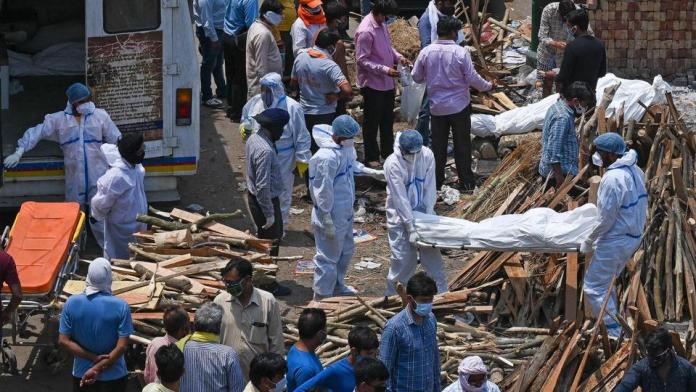ISLAMABAD, The government of Indian prime minister Narendra Modi is under fire with criticism pouring in from all over for ignoring the lethality of the ongoing wave of COVID-19 that has led to alarming death rate in the country.
The medical journal The Lancet has severely criticised the Narendra Modi government for its handling of the COVID-19 crisis in India, saying it has given the impression of being more occupied with “removing criticism on Twitter than trying to control the pandemic”.
The editorial of the world’s oldest and best-known general medical journals minced no words, saying that India’s top government officials prematurely declared victory over the pandemic – highlighting health minister Harsh Vardhan’s comment that ‘India is in the endgame’, leading to “complacency and insufficient preparation”.
“The modelling suggested falsely that India had reached herd immunity, encouraging complacency and insufficient preparation, but a survey by the Indian Council of Medical Research in January suggested that only 21% of the population had antibodies against SARS-CoV-2,” the editorial says.
The editorial comes at a time when many Indians are struggling to find hospital beds and oxygen cylinders for COVID-19 patients who require critical care. On Saturday, India reported its highest death toll yet due to COVID-19, recording 4,187 fatalities. The country also reported 401,078 new infection, the third consecutive day with more than 0.4 million new cases.
The journal also criticised the government’s decision – despite warnings – to allow religious and political congregations. These events are “conspicuous for their lack of COVID-19 mitigation measures”, the editorial said.
“The message that COVID-19 was essentially over also slowed the start of India’s COVID-19 vaccination campaign, which has vaccinated less than 2% of the population. At the federal level, India’s vaccination plan soon fell apart. The government abruptly shifted course without discussing the change in policy with states, expanding vaccination to everyone older than 18 years, draining supplies, and creating mass confusion and a market for vaccine doses in which states and hospital systems competed,” The Lancet said.
The journal said that the country’s “botched” vaccination campaign must immediately be rationalised and implemented with all due speed. It saw two immediate bottlenecks: increasing vaccine supply (some of which should come from abroad) and setting up a distribution campaign that will also cover rural and poorer citizens, who “face a desperate scarcity of public health and primary care facilities”. “The government must work with local and primary health-care centres that know their communities and create an equitable distribution system for the vaccine,” it suggested.
The Lancet asked the government to publish “accurate data in a timely manner”, and forthrightly explain to the public what is happening and what is needed to bend the epidemic curve. The editorial says the government must also consider the possibility of a new federal lockdown.
“Modi’s actions in attempting to stifle criticism and open discussion during the crisis are inexcusable,” it said.
Citing estimates made by the Institute for Health Metrics and Evaluation, The Lancet said India could see one million deaths from COVID-19 by August 1.
“If that outcome were to happen, Modi’s Government would be responsible for presiding over a self-inflicted national catastrophe.,” the editorial says.
The success of this restructured response will depend on the government “owning up to its mistakes, providing responsible leadership and transparency, and implementing a public health response that has science at its heart”, it concluded.
Ashish K. Jha, Physician and Dean of Brown Public Health, UK said Indian government was not telling the correct figures of COVID-19 cases and deaths. He said the number of dead in crematoriums are “telling us the disease is much worse than the official statistics”.
Vinod K. Jose, Executive Editor The Caravan India and Alumnus Columbia Journalism School New York severely criticized the policies of Modi government for ignoring the warnings about the fatal wave of coronavirus.
The Economist in its article said India’s COVID-19 crisis has spiralled out of control as the region is recording four times as many cases today as it was at the peak of the first wave.
It said India’s “mountain” of new COVID-19 infections is like none other in the course of the pandemic. On April 30th the daily tally of new cases surpassed 400,000, making the country’s current caseload far and away the heaviest yet (the next-biggest outside India was America’s 300,000 new cases recorded on January 2nd).
“Even that terrible figure is sure to be an underestimate. The share of Indians testing positive for COVID-19 is now 23.5%; if a greater proportion of India’s population of 1.4bn were tested, no doubt millions of new cases would be detected,” it said.
The article mentioned that compared with the scale of South Asia’s first wave, which peaked in September, the second was “shocking”. South America, another region with a surging caseload, is recording 60% more cases today than at the peak of the first wave. South Asia is logging four times as many, and with hardly a sign of slowing, it said.
Follow the PNI Facebook page for the latest news and updates.









